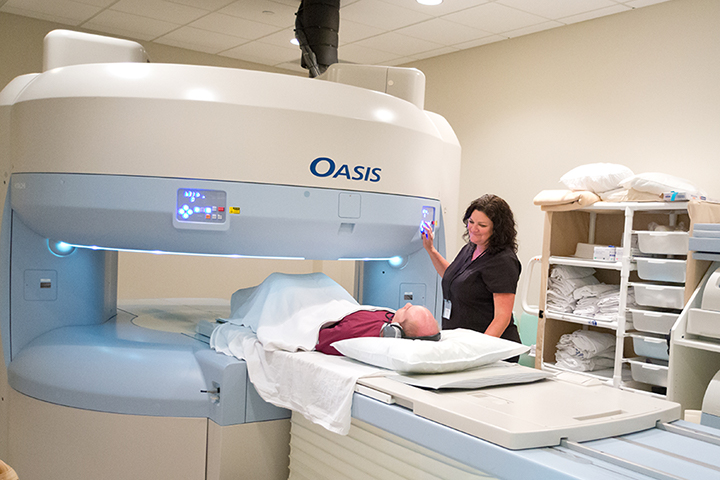
What is an MRI?
Magnetic resonance imaging (MRI) is one form of imaging used by physicians to obtain clinically useful diagnostic information. Incorporating advanced technology, MRI produces images of anatomy without the use of radiation that is required with other imaging modalities such as x-ray or CT. An MRI can also show soft tissue injuries that will not appear on other imaging machines.
What is an Open MRI?
The MRI machine at Iowa Ortho is an open unit, which means it is open on the sides. Open MRI machines are designed to be more comfortable for patients. Unlike traditional MRI machines, which require you to lie down in a narrow tube, open MRI machines have an open design. This means you won’t feel as confined, and depending on your scan (not all body parts allow this) you’ll be able to see outside of the machine.
How does an MRI work?
Images from the MRI machine are formed when signals emitted by body tissue are processed by software and turned into clinical images. These signals are generated using a safe magnetic field in combination with radio waves of a specific frequency. Different tissue characteristics are translated into different contrast levels (shades of gray) on the image. This is how your doctor can diagnose any soft tissue injuries.
What to Expect:
- Expect to remove any jewelry and body piercings.
- Expect to remove any hair pins, bobby pins, barrettes, clips, etc.
- Expect to put your valuables in a locker.
- Expect to remove eyeglasses and hearing aids.
- Expect to change into an MRI safe outfit (provided).
You will lay down on the bed on the MRI machine and the technologist will position you to get the best images of your injury. When positioned correctly, the bed will slowly glide into the machine.
A technologist will be able to see you at all times. An intercom system is built into the machine so if you need anything, the technologist will be right there. To make your experience as relaxing as possible, the technologist may give you a pair of headphones and you can choose music you’d like to listen to! If headphones are not an options for your exam then you will be given ear plugs for hearing protection. Some patients even fall asleep during their MRI. To ensure your images are as clear as possible, try to relax and remain still during the scan. A typical procedure averages 30 minutes or longer, depending on the type of information required by your physician.
What to Bring:
- Insurance card
- Photo ID
- Any co-payments or account balances. We will collect monies due at this time.
How to Schedule an MRI:
- First, you’ll have an appointment with an Iowa Ortho provider.
- Your provider will determine if you need an MRI. If they think you do, they will order one.
- Someone from our outpatient testing team will call you to schedule the scan and assist you in completing all necessary paperwork, such as a pre-screening form. Please note that you will be asked to provide any previous imaging of the injured body part as well as past treatment and/or operative notes. We can assist you in gathering past records.
If you have any questions about an upcoming MRI, or if you’d like to schedule an appointment with an Iowa Ortho provider, please call our office at 515-247-8400 or request an appointment online.
